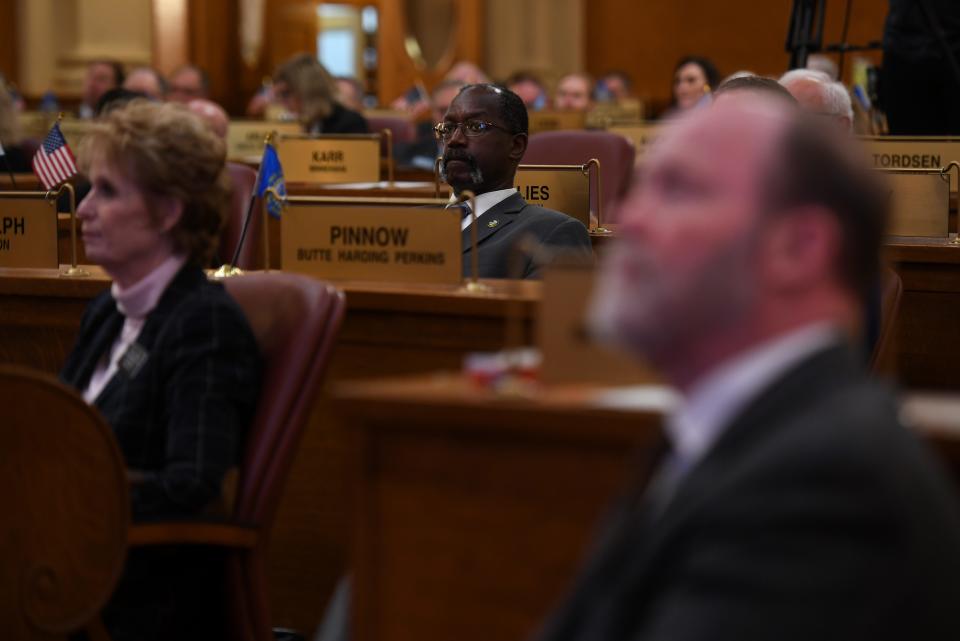Lawmaker pens letter to SD Supreme Court opposing Legislature's conflict of interest brief
- Oops!Something went wrong.Please try again later.
- Oops!Something went wrong.Please try again later.
A group of lawmakers have disagreed with the South Dakota Legislature's position that the conflict of interest clause in the state’s Constitution does not apply to funds authorized by the General Appropriations bill.
Rep. Jon Hansen, R-Dell Rapids, sent a letter Friday to the South Dakota Supreme Court, stating he and 16 other lawmakers think a majority of state spending would fall outside the conflict of interest protections as laid out by the constitution if the court adopted the Legislative position.
“Any interpretation of Article 3, Section 12 should err on the side of taxpayer protection against legislative conflicts and not on the side of monetary gain for members of the legislature via taxpayer money,” Hansen wrote.

The letter comes after the Legislature, the Governor’s Office and the Attorney General’s Office filed briefs to the Supreme Court on their positions interpreting the conflict of interest clause and asking the justices to define what an indirect benefit means. Gov. Kristi Noem requested an advisory opinion from the justices in late October following the resignation of Rapid City Republican Senator Jessica Castleberry after she violated the state constitution by accepting federal COVID-19 pandemic stimulus funds for her business.
The contract clause, also known as Article 3, section 12, in the state constitution, reads:
More: New briefs details South Dakota officials' questions about conflict of interest clause
“Any member of the Legislature during the term for which he shall have been elected, or within one year thereafter, be interested, directly or indirectly, in any contract with the state or any county thereof, authorized by any law passed during the term for which he shall have been elected.”
The brief from the Governor’s Office looked at what indirect means while seeking to answer the nine questions Noem laid out for the justices to opine on. Noem has said she won’t appoint a new lawmaker to Castleberry's spot, or to fill the spot left by the resignation of Rep. Jess Olson, R-Rapid City, until the justices issue their opinion.
The Attorney General’s Office wrote that certain questions depend on a case-by-case basis.
More: Noem, AG, lawmakers seek clarity on what an 'indirect' contract benefit is
The Legislative brief argued lawmakers weren’t in violation of the contract clause if the funds came through the General Appropriations bill, but if a lawmaker received either a direct or indirect benefit from a special appropriation that would violate the constitution.
The nature of the General Appropriations bill sets up blanket funding, meaning lawmakers don’t authorize specific contracts for each state department or agency, Ron Parsons, the lawyer for the Legislature, wrote.
The Legislature's brief sided with Chief Justice David Gilbertson’s dissent from a Supreme Court case from 2001 that found a sitting lawmaker who was an employee of South Dakota State University had an indirect interest in a state contract because of her position.
“Deciphering meaning beyond the stated expenditure amounts in a general appropriations bill is not possible,” Parsons wrote about the Pitts v. Larson case.

That’s where Hansen and the other lawmakers took issue with the brief. Hansen wrote lawmakers only had the chance to view the brief Dec. 12, after the deadline to submit an amicus brief had passed.
The position the Legislature took is contradictory to what the Supreme Court has ruled in the past, Hansen wrote, and that Pitts should not be overruled.
“When it comes to state spending, ‘authorizing’ a continuing expense is done so by ‘funding’ the expense in the budget,” according to the letter.
“To hold–as the Legislature’s Brief asserts–that essentially all spending authority contained in the General Appropriations Bill–which constitutes the overwhelming majority of state spending–falls outside the scope of Article 3, Section 12, would be contrary to the plain meaning of the Constitutional provision and to this Court’s precedent, and would gut the protections for taxpayers from legislative abuse contained in Article 3, Section 12,” Hansen wrote.
More: South Dakota legislator’s conflict of interest puts meaning of ‘indirect’ under microscope
Hansen requested leave of court so that the letter could be included and asked for the court to provide clarity on the meaning of an indirect benefit for lawmakers, future candidates, and to protect taxpayers.
Other Sioux Falls and surrounding area lawmakers who signed the letter include, Rep. Chris Karr, R-Sioux Falls, Rep. Aaron Aylward, R-Harrisburg, Rep. Karla Lems, R-Canton, Rep. Bethany Soye, R-Sioux Falls, and Sen. Tom Pischke, R-Dell Rapids.
It’s unclear when the Supreme Court will issue their opinion. The 99th Legislative Session starts Jan. 9 in Pierre.
This article originally appeared on Sioux Falls Argus Leader: Jon Hansen disagrees with SD Legislature's conflict of interest brief

